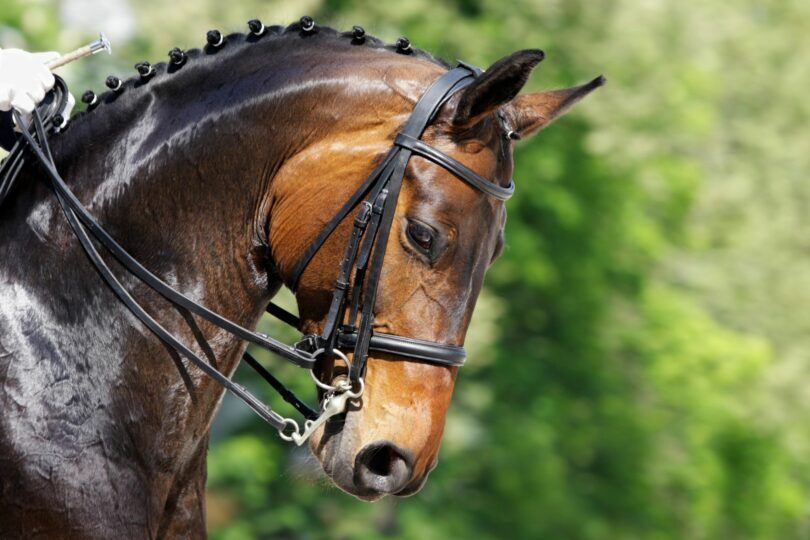Do Horses Sweat Like People?
Just like humans, horses sweat to lower their body temperature. As they sweat, the liquid they produce evaporates, drawing energy from their skin in the form of heat, which helps to reduce their body temperature. As the horse sweats, he loses electrolytes, which he needs to regulate his fluid levels, aid digestion, maintain the correct pH, and perform vital neurological functions.
For horses and primates, sweating is a natural thermoregulatory function. Horses that can’t sweat suffer from a condition known as anhidrosis and are prone to heat strokes and stress. A healthy horse sweats only in hot weather or when exercising. In other circumstances, sweating may indicate pain, illness, or distress.
Source: Canva
The Why Behind Sweat
Breathing helps to cool a horse, but on a hot day or if the horse is exercising, it may not be enough to compensate for the heat buildup.
When this happens, the hypothalamus sends a message to the sweat glands, telling them to produce fluids to reduce the body temperature even further.
The Science of Sweat
Although primates and horses both sweat, the chemical composition of the fluid they produce is very different. Horse sweat contains more electrolytes and various proteins, such as sodium, magnesium, calcium, potassium, and chloride.
Horse sweat also contains latherin—a substance that’s absent from human sweat. Latherin is responsible for the white foamy appearance of horse sweat and makes the evaporation process more efficient, which is necessary due to the horse’s thick, waterproof coat.
Source: Canva
Sweat Production: Quantity
In warm weather, a horse that’s moderately active or exercising (i.e. trotting and cantering) can produce between one and two gallons of sweat every hour.
That’s roughly twice as much sweat per square inch as a human!
The Need for Electrolytes
As a horse’s sweat contains proteins and electrolytes, excessive sweating depletes these vital components to potentially critical levels, causing muscle tremors, fatigue, heat stress, and muscle weakness.
Excessive sweat loss can result in a condition known as Synchronous Diaphragmatic Flutter (SDF), or the thumps, where the horse’s diaphragm spasms in time with the heartbeat, disrupting its respiration.
You can prevent and treat all these conditions, and more severe ones like exhausted horse syndrome, with the correct use of electrolytes.
 The Anhidrotic Horse
The Anhidrotic Horse
An anhidrotic horse struggles to produce enough sweat to regulate its body temperature, making it susceptible to heat stroke and stress. This condition is relatively rare, although more common in hot, humid environments. According to a study of non-racing horse farms in Florida, “1.8% of horses were anhidrotic.”
There is no treatment for anhidrosis in horses, and your only option would be to move the horse to a cooler climate.
Source: Canva
Sweating by Animal Species
| Question | Answer |
| Do horses sweat? | Yes, horses sweat to regulate their body temperature |
| Do dogs sweat? | Dogs can’t sweat and rely on panting to lower their body temperature |
| Do cows sweat? | Cows do sweat, but not effectively enough to regulate their body temperature, so they rely on respiration instead. |
| Do pigs sweat? | Pigs don’t sweat even though they appear to have the necessary glands and morphology. Instead, they cool themselves by panting or wallowing. |
| Do bears sweat? | Bears don’t have sweat glands, so use other methods to cool down, like lying on the ground, panting, or submerging themselves in water. |
| Do birds sweat? | Birds don’t sweat but can beat the heat by panting, ruffling their feathers, or splashing in a birdbath or puddle. |
Source: Canva
Frequently Asked Questions
Q: Do horses sweat when hot?
Horses do sweat when they’re hot, and the process of evaporation acts as an effective form of thermoregulation.
Q: Do horses sweat when in pain?
Horses do sometimes sweat in pain, especially if they’re suffering from colic, botulism, Cushing’s syndrome (PPID), or laminitis.
Q: Do horses sweat through their hooves?
Surprisingly enough, horses do perspire through their hooves, even though there are no sweat or apocrine glands present.
Instead, the hoof expresses moisture from the vascular system – a process that helps to strengthen the hoof and protect it against concussive injury.
Q: Do horses sweat differently than humans?
Although horses sweat much like humans do, the composition of that sweat is very different. Human sweat consists primarily of water, whereas horse sweat has a higher concentration of proteins and electrolytes.
Q: Do horses sweat through their skin?
A horse’s skin is packed with sweat glands, which enable it to sweat through its skin.
Q: Why do horses sweat but not dogs?
Horses have large numbers of sweat glands, which enable them to sweat, whereas dogs only have a few, making them incapable of sweating effectively.
Q: Why is horse sweat white?
Horse sweat contains latherin, which is what causes it to appear white and foamy.
Q: Do horses sweat foam?
Although horses’ sweat appears foamy, they actually sweat a liquid. The foamy appearance comes from latherni—a protein found in the sweat.
Source: Canva
Parting Thoughts
Horses need to sweat to regulate their body temperature, especially in hot weather or when engaged in vigorous exercise. Horses who are incapable of sweating have a condition known as anhidrosis and may develop heat stroke or hypothermia.
Although sweating is normal, in some circumstances it may be a sign of pain, distress, or illness.
P.S. Enjoy this article? Trot on over to:
- You Can Lead A Horse To Water…Horse Hydration Tips
- Buh-Bye Buckets: 5 Best Automatic Horse Waterers
- Seven Boredom Bustin’ Horse Pasture Toys
- A Pinch Or A Pound? How to Feed Loose Salt to Horses
- Horse Mineral Management: What’s the Best Block to Feed?
- 30+ Equine Nutrition Terms Your Horse Wishes You Knew
- 10 Top Treats for Training Your Horse “The Nice Way”
- 5 Best Waterless Horse Shampoos
Sources:
https://www.extension.iastate.edu/equine/blog/dr-peggy-m-auwerda/electrolytes-and-exercising-horse
https://largeanimal.vethospitals.ufl.edu/equine-anhidrosis/
https://equinewellnessmagazine.com/soft-hooves/
https://bestfarmanimals.com/why-is-my-horse-sweating-signs-and-dangers-of-horse-sweat/

